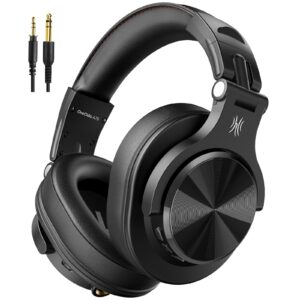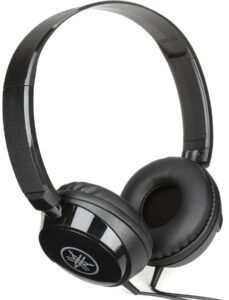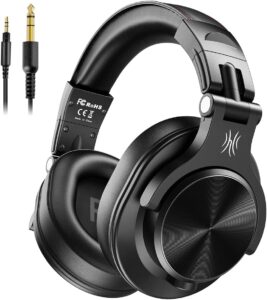We independently select all products and services. If you click through links we provide, Mighty Deals may earn a commission.
Playing a digital piano with headphones can transform your practice sessions. Headphones allow you to immerse yourself in the music without worrying about disturbing others. Whether you’re a beginner working on scales or an experienced player fine-tuning your technique, a good pair of headphones ensures you hear every note with clarity and detail.
When choosing headphones for a digital piano, sound quality is essential. Look for headphones that deliver balanced tones, emphasizing both high and low frequencies without distortion. Comfort is also critical, especially if you practice for long stretches. Features like cushioned ear cups and adjustable headbands make a difference. Additionally, compatibility with your piano’s audio output is a must to avoid any connectivity issues.
To help you find the right option, we researched and tested several pairs of headphones designed for digital piano players. We evaluated sound quality, comfort, durability, and overall value to identify the top choices for musicians at every level.
Best Headphones for Digital Piano
We’ve gathered a selection of the best headphones for digital piano that combine comfort, sound quality, and value.
1. OneOdio A70 Headphones
If you’re looking for versatile, long-lasting headphones for your digital piano, the OneOdio A70 delivers solid performance at a great value.
Pros
- Impressive sound clarity with balanced bass and highs.
- Extremely comfortable for extended practice sessions.
- Offers both wireless and wired options for flexibility.
Cons
- No active noise cancelation could be better for noisy spaces.
- The bass might be too intense for some users.
- Build quality feels slightly less premium.
The OneOdio A70 surprised us with its sound quality. The audio is crisp and well-defined, making it easy to catch subtle nuances when practicing our digital piano. The bass is strong but not overwhelming, giving a rich tone that complements various musical styles beautifully. Switching between wired and wireless modes is seamless, which gives us extra convenience depending on the situation.
Wearing these headphones for long stretches is a breeze, thanks to the plush ear padding and ergonomic design. It’s easy to forget we even have them on during extended practice or recording sessions. The foldable design makes it incredibly handy to store or carry these around, especially for musicians on the move.
While the A70 has plenty to love, perfection is elusive. It doesn’t feature active noise cancelation, which would have helped during noisy practice settings. Additionally, the bass-heavy sound profile might not suit those who prefer a more neutral tone for classical piano. Despite its solid audio performance, the plastic-heavy build might not feel as premium as higher-end alternatives.
2. Yamaha HPH-50 Headphones
For anyone who wants lightweight, affordable headphones with balanced sound, these are a solid pick.
Pros
- Balanced sound that’s great for digital piano practice
- Comfortable fit, even during long sessions
- Sleek, compact design with a swivel earcup feature
Cons
- Limited bass depth might bother some users
- Non-detachable long cord can feel excessive
- No noise isolation feature for noisy environments
The Yamaha HPH-50 headphones stood out for delivering clean, crisp sound that complements digital piano tones beautifully. We immediately noticed how natural the audio felt during both lower and higher tones. It doesn’t emphasize bass unnecessarily, which works perfectly for piano practice.
The swivel earcups are a nice touch, making it easier to get a snug fit. Comfort didn’t seem to be an issue, even during extended playtime sessions. The lightweight design meant no discomfort weighing us down, and they look polished in either black or white.
That said, the long cord is a bit cumbersome unless you’re using it at a stationary setup like a digital piano. For anyone in a noisier environment, these don’t block out external sound, so they’re not ideal for noisy spaces. However, for the price, these headphones strike the right balance of sound quality, comfort, and practicality.
3. OneOdio A71 Headphones
If you’re looking for affordable headphones with solid sound quality and comfort for digital piano practice, these could be the right choice.
Pros
- Comfortable ear cushions that reduce fatigue during long sessions.
- Crisp and clear sound makes music feel immersive.
- Convenient dual audio jacks for seamless device connectivity.
Cons
- Build quality feels lightweight and might not hold up over heavy use.
- Bass-heavy sound can overpower mids and highs at times.
- Coiled cable can feel bulky and restrictive during setup.
The ear cushions make a noticeable difference in comfort, especially during longer practice hours. We could wear these for extended sessions without feeling any discomfort. The adjustable headband is easy to tweak, ensuring a snug fit no matter the head size.
The sound quality is surprisingly good for this price range. We appreciated the clarity and depth, which made playing the digital piano more engaging and satisfying. However, the bass seemed too prominent in some usage scenarios, which might be off-putting to those preferring a more balanced sound.
When using these, convenience was a standout feature. The dual audio jack options gave us flexibility to connect to various devices, eliminating the need for multiple adapters. On the downside, the cable’s bulky design and lightweight frame left us wondering if it could endure frequent use over time.
Buying Guide
When selecting headphones for a digital piano, we need to consider several factors to ensure the best experience. Here’s what to look for:
1. Sound Quality
Clear and balanced audio is essential. We should opt for headphones that offer accurate sound reproduction to capture the piano’s full range, from deep bass to crisp highs.
2. Comfort
Long practice sessions require comfortable designs. Look for adjustable headbands, lightweight builds, and well-padded ear cups made from soft materials like memory foam.
3. Noise Isolation
Good noise isolation helps focus on playing without distractions. Over-ear, closed-back headphones are typically more effective at blocking external sounds.
4. Connectivity
Check for compatibility with our digital piano’s output. Most models use a standard 6.35mm jack or 3.5mm adapter. Wired headphones are preferred for consistent audio, but cable length should be sufficient to allow comfortable movement.
5. Durability
Durable materials and a sturdy build are important for daily use. Reinforced cables can help prevent wear and tear over time.
6. Portability
If we plan to take the headphones on the go, foldable designs and cases can make transportation easier.
| Feature | Considerations |
|---|---|
| Sound Quality | Full range, accurate reproduction |
| Comfort | Adjustable fit, soft padding |
| Noise Isolation | Effective external sound blocking |
| Connectivity | Compatibility with piano output; sufficient cable length |
| Durability | Sturdy materials and build quality |
| Portability | Foldable design, protective case |
By prioritizing these features, we can find headphones that enhance our digital piano experience effectively.
Frequently Asked Questions
When choosing headphones for a digital piano, it’s essential to prioritize comfort, sound quality, and compatibility to ensure the best playing experience. Below, we address common concerns and provide practical suggestions.
What features are important when selecting headphones for a digital piano?
We should focus on headphones that deliver balanced sound with clear mids and highs for accurate note reproduction. Comfort is key, especially for extended sessions, so look for lightweight designs and adjustable headbands. Closed-back headphones help isolate external noise for better immersion.
Can you recommend durable headphones suitable for extended piano practice sessions?
Durability matters for frequent use, and headphones with metal or reinforced plastic frames often hold up better over time. Models with replaceable ear pads and cables add longevity. Brands like Audio-Technica and AKG make sturdy options worth considering.
How does impedance affect the choice of headphones for piano keyboards?
Headphones with lower impedance (typically below 50 ohms) are ideal for digital pianos because they work efficiently with the built-in amplifier. Higher-impedance models might require additional equipment to perform optimally, which can complicate setup.
Are there specific headphones that pair well with Yamaha digital pianos?
Yamaha digital pianos pair well with headphones designed for accurate sound reproduction, such as those from Sennheiser or Beyerdynamic. These brands often provide the clarity and precision needed to match Yamaha’s sound profiles.
What are some highly-rated budget-friendly headphones for digital piano use?
We recommend affordable models like the Audio-Technica ATH-M20x or the Sony MDR-7506. These offer good sound quality and comfort without straining your budget, making them ideal for beginner or casual use.
Should I choose wired or wireless headphones for optimal sound quality when playing a digital piano?
Wired headphones typically provide better sound consistency and eliminate latency concerns, which are important for real-time playing. Wireless models can offer more convenience but may introduce slight lag, so they’re less suitable for advanced practice.




